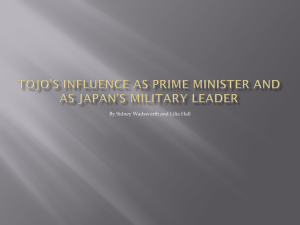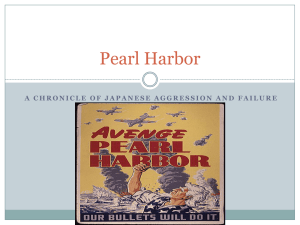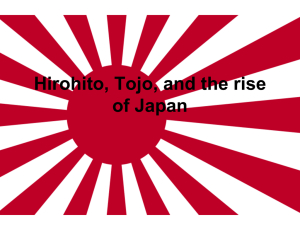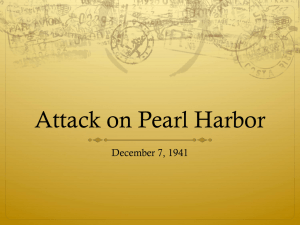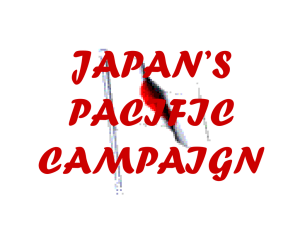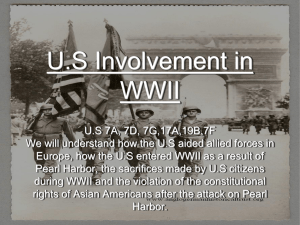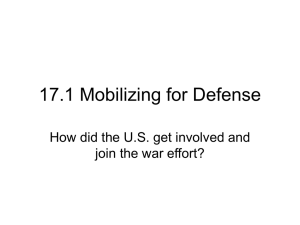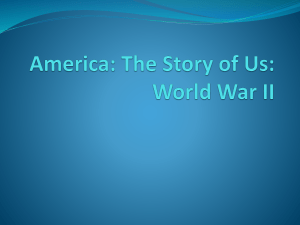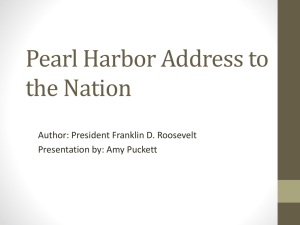Interactive_smithj2768_30201_Smith_Interactive
advertisement
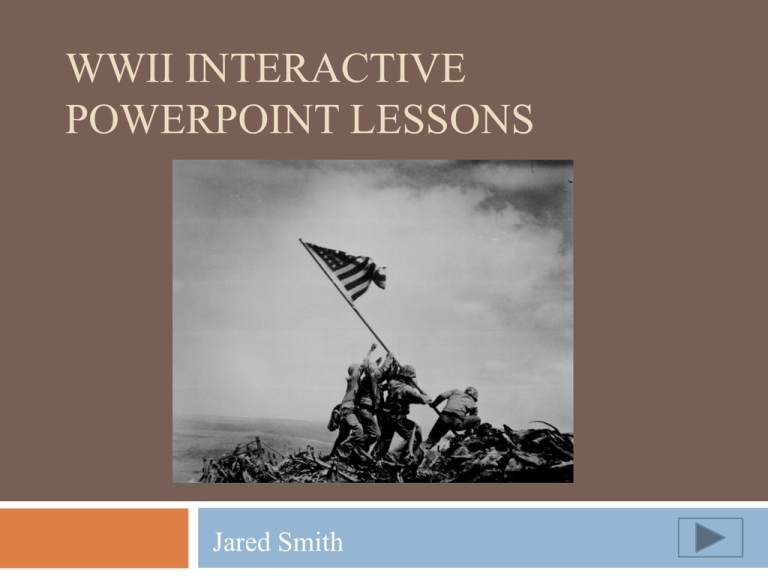
WWII INTERACTIVE POWERPOINT LESSONS Jared Smith Directions Read through each slide Use the action button in the bottom right hand corner to advance to the next slide Answer each question: If answered correctly you will advance to the correct page, and will be able to advance to the next slide If answered incorrectly you will be advanced to the incorrect page and will have to click on again, and will have to reanswer the question till its answered correctly Goals Students will be able describe the impact Hideki Tojo had on Japan. Students will understand the Genocide that took place during the Holocaust. Students will understand the course of events that occurred at Pearl Harbor on December 7th, 1941. Table of Contents Lesson One: Hideki Tojo Lesson Two: Nazi Concentration Camps Lesson Three: Pearl Harbor Lesson One: Hideki Tojo Biography Hideki Tōjō was born in the Kōjimachi district of Tokyo in 1884. He was the third son of Hidenori Tōjō, a lieutenant general in the Imperial Japanese Army. He was the third son of Hidenori Tōjō, a lieutenant general in the Imperial Japanese Army. In 1909 he married Katsuko Ito, with whom he had three sons and four daughters. Early Military Career Tojo graduated from the 17th class of the Imperial Japanese Army Academy in 1905, ranked 42nd out of 50 cadets, and was commissioned as a Second Lieutenant in the infantry. He graduated with top grades from the 27th class of the Army Staff College in 1915, after which he was promoted to the rank of captain and assigned as commander of the 3rd Imperial Guards Regiment. Early Military Career In 1919, he was dispatched to Germany as a military attaché. On his return to Japan in 1920, he was promoted to major. In 1921, he again traveled overseas, this time as a resident officer in Germany. In 1922, Tojo returned to Japan to assume the post of instructor at the Army Staff College. In 1929, he was promoted to lieutenant colonel. Question One In 1922 Tojo returned to Japan to take up what post? A. Colonel B. Admiral of the Navy C. Instructor at the Army Staff College D. General of the Japanese Army in Germany Incorrect Oops, please try that question again Correct Nice! Please move on to the next slide Early Military Career During the 1920s, Tojo became involved in Army politics. He was a leading member of the Toseiha along with Kazushige Ugaki, Hajime Sugiyama, Kuniaki Koiso, Yoshijiro Umezu, and Tetsuzan Nagata. They attempted to represent the more conservative moderates in opposition to the extremist Kodoha group led by Sadao Araki. Hideki Tojo in Military Uniform Rise to Prime Minister In October 18, 1941, Tojo was appointed Army Minister in the second Fumimaro Konoe Cabinet, and remained in that post in the third Konoe Cabinet. He was a strong supporter of the Tripartite Alliance between Japan, Nazi Germany and Fascist Italy. As Army Minister he continued to expand the war with China. Question Two Tojo was appointed minister of the army in what year? A. B. C. D. 1941 1942 1943 1944 Incorrect Oops, please try that question again Correct Nice! Please move on to the next slide Rise to Prime Minister At the time, Prince Higashikuni Naruhiko was said to be the only person who could control the Army and the Navy and was recommended by Konoe and Tojo. Hirohito rejected this option, arguing that a member of the imperial family should not have to eventually carry the responsibility for a war against the Occident. Following the advice of Koichi Kido, he chose instead Tojo, who was known for his devotion to the imperial institution. The Emperor summoned Tojo to the Imperial Palace one day before Tojo took office. Rise to Prime Minister He was given one order from the Emperor: To make a policy review of what had been sanctioned by the Imperial conferences. Tojo, who was on the side of the war, nevertheless accepted this order, and pledged to obey. On November 2, Tojo and Chiefs of Staff Hajime Sugiyama and Osami Nagano reported to Hirohito that the review had been in vain. The Emperor then gave his consent to war Rise to Prime Minister On 5 November, Hirohito approved in Imperial conference the operations plan for a war against the West and had many meetings with the military and Tojo until the end of the month. On 1 December, another imperial conference finally sanctioned the "War against the United States, England and Holland”. Question Three On December 1st, the imperial conference sanctioned the war against three countries, which one of these countries did the conference not sanction war against? a. b. c. d. US France Britain Holland Incorrect Oops, please try again Correct Nice! Please move on to the next slide As Prime Minister Tojo continued to hold the position of Army Minister during his term as Prime Minister, from 18 October 1941 to 22 July 1944. He also served concurrently as Home Minister from 1941-1942, Foreign Minister in September 1942, Education Minister in 1943, and Commerce Minister in 1943. Tojo before the International Military Tribunal for the Far East Capture, Trial and Execution When American military police surrounded the house on 8 September 1945, they heard a muffled shot from inside. Major Paul Kraus and a group of military police burst in. Tojo had shot himself 4 times in the chest, but despite shooting directly through the mark, the bullets missed his heart and penetrated his stomach. Capture, Trial and Execution He was sentenced to death on 12 November 1948 and executed by hanging on 23 December 1948. In his final statements he apologized for the atrocities committed by the Japanese military and urged the American military to show compassion toward the Japanese people, who had suffered devastating air attacks and the two atomic bombs. Question four Hideki Tojo was sentenced to death on November 18th, and executed on December 23rd of which year? a. b. c. d. 1948 1949 1950 1951 Incorrect Oops, please try again Correct Nice! Please move on to the next slide Lesson Two: Nazi Concentration Camps – The Experiments Experiments During World War II, Nazi doctors conducted as many as 30 different types of experiments on concentration-camp inmates. They performed these studies without the consent of the victims, who suffered indescribable pain, mutilation, permanent disability, or in many cases death as a result. At the Nuremberg "doctor's trial," which brought 23 German doctors to trial immediately after the war, prosecutors found 15 defendants guilty of war crimes and crimes against humanity; seven were hung. Here are some of the most notorious experiments: High Altitude In 1942, Sigmund Rascher and others conducted high-altitude experiments on prisoners at Dachau. Eager to find out how best to save German pilots forced to eject at high altitude, they placed inmates into low-pressure chambers that simulated altitudes as high as 68,000 feet and monitored their physiological response as they succumbed and died. High Altitude Rascher was said to dissect victims' brains while they were still alive to show that high-altitude sickness resulted from the formation of tiny air bubbles in the blood vessels of a certain part of the brain. Of 200 people subjected to these experiments, 80 died outright and the remainder were executed. Question Five True or False: Nazi doctors did high altitude test on prisoners because they were trying to find out how best to save German pilots forced to eject at high altitudes? True False Incorrect Oops, please try again Correct Nice! Please move on to the next slide Freezing To determine the most effective means for treating German pilots who had become severely chilled from ejecting into the ocean, or German soldiers who suffered extreme exposure on the Russian front, Rascher and others conducted freezing experiments at Dachau. For up to five hours at a time, they placed victims into vats of icy water, either in aviator suits or naked; they took others outside in the freezing cold and strapped them down naked. Freezing As the victims writhed in pain, foamed at the mouth, and lost consciousness, the doctors measured changes in the patients' heart rate, body temperature, muscle reflexes, and other factors. Some 80 to 100 patients perished during these experiments. Question Six True or False: As the victims writhed in pain, foamed at the mouth, and lost consciousness, the doctors measured changes in the patients' heart rate, body temperature, muscle reflexes, and other factors. True False Incorrect Oops, please try again Correct Nice! Please move on to the next slide Twins In an effort to find ways to more effectively multiply the German race, Dr. Josef Mengele performed experiments on twins at Auschwitz in hopes of plumbing the secrets of multiple births. After taking all the body measurements and other living data he could from selected twins, Mengele and his collaborators dispatched them with a single injection of chloroform to the heart. Twins Of about 1,000 pairs of twins experimented upon, only about 200 pairs survived. Question Seven Of about ______ pairs of twins experimented upon, only about ____ pairs survived? a. b. c. d. 2000; 100 2000; 200 1000; 100 1000; 200 Incorrect Oops, please try again Correct Nice! Please move on to the next slide Seawater Dr. Hans Eppinger and others at Dachau conducted experiments on how to make seawater drinkable. The doctors forced roughly 90 Gypsies to drink only seawater while also depriving them of food. The Gypsies became so dehydrated that they reportedly licked floors after they had been mopped just to get a drop of fresh water. The experiments caused enormous pain and suffering and resulted in serious bodily injury. Tuberculosis To determine if people had any natural immunities to tuberculosis, and to develop a vaccine against the disease, Dr. Kurt Heissmeyer injected live tubercle bacilli (bacteria that are a major cause of TB) into the lungs of inmates at the Neuengamme concentration camp. About 200 adult subjects died, and Heissmeyer had 20 children from Auschwitz hung in an effort to hide evidence of the experiments from approaching Allied forces. Question Eight True or False: Seawater experiments on the gypsies made them so dehydrated that they reportedly licked floors after they had been mopped just to get a drop of fresh water. True False Incorrect Oops, please try again Correct Nice! Please move on to the next slide Lesson Three: The Attack on Pearl Harbor Japan attacks the US The tide pushing the United States toward War was flowing much faster than either leader knew. To almost everyone’s surprise, however, the attack that brought the United States into the war came from an unexpected country-not from Germany but from Japan. Japan’s Ambition In Japan, expansionists had long dreamed of creating a vast colonial empire that would stretch from Manchuria and China south to Thailand and Indonesia. The Japanese began their southward push in July of 1941 by taking over French military bases in Indochina. The United States protested this new act of aggression by cutting off trade with Japan. Japan’s Ambition The embargoed goods included the one thing Japan could not live without-oil to fuel its war machine. Japanese military leaders warned that, without oil, Japan could be defeated without its enemies ever striking a blow. The leaders declared that Japan must either persuade the United States to end its oil embargo or seize the oil fields in the Dutch East Indies. Question Nine When the US cut off trade with Japan, which major product were the Japanese now so concerned with getting? a. b. c. d. Coal Steel Oil Food Incorrect Oops, please try again Correct Nice! Please move on to the next slide Japan’s Ambition In October, the militant Japanese general Hideki Tojo became the new prime minister of Japan. Shortly after taking office, Tojo met Japan’s revered emperor, Hirohito. November 5, 1941, the prime minister ordered the Japanese navy to prepare for an attack on the United States. Japan’s Ambition The U.S. military had broken japans secret communication codes and knew that Japan was preparing for a strike. What it didn’t know was where the attack would come. Late in November, Roosevelt sent out a “war warning” to military commanders in Hawaii, Guam, and the Philippines. Pearl Harbor Memorial Japan’s Ambition Then, late on December 6, 1941, the president received a decoded message that had been intercepted. This message instructed Japans peace envoy to reject all American peace proposals. Japan’s Ambition “This means war,” Roosevelt told his friend and adviser Harry Hopkins. “It’s too bad we can’t strike first and prevent a surprise,” Hopkins replied. “No, we can’t do that,” Roosevelt reportedly responded. “We are a democracy of peaceful people. We have a good record. We must stand on it.” Question Ten Why didn’t President Roosevelt attack Japan before they could attack us, if he knew it was going to happen? a. b. c. d. Wasn’t 100% sure an attack was imminent Did not want to face the political pressure Was fearful of the Japanese Wanted to uphold our Democratic record Incorrect Oops, please try again Correct Nice! Please move on to the next slide The attack on Pearl Harbor Early the next morning, a Japanese dive-bomber swooped low over the U.S. naval base at Pearl Harbor-the largest us. naval base in the pacific. The bomber was followed by more than 180 Japanese warplanes launched from six aircraft carriers. As the first Japanese bombs found their targets, a radio operator flashed this message: “Air raid on Pearl Harbor. This is not a drill.” The attack on Pearl Harbor For an hour and a half, the Japanese planes were barely disturbed by American antiaircraft guns and blasted target after target. For Japan, the attack on Pearl Harbor was a stunning victory. The Japanese navy all but crippled the entire U.S. Pacific Fleet in one blow. Its own casualties numbered only 29 planes. The attack on Pearl Harbor At the white house Eleanor Roosevelt watched closely as her husband, with a “deadly calm,” absorbed the news from Hawaii, “each report more terrible than the last.” The surprise raid had sunk or badly damaged 18 ships. About 350 planes had been destroyed or severely damage. Some 2,400 people had died, and another 1,178 had been wounded. Question Eleven The surprise raid had sunk or badly damaged ___ ships. About ___ planes had been destroyed or severely damage. a. b. c. d. 18; 350 19; 300 18; 300 19; 350 Incorrect Oops, please try again Correct Nice! Please move on to the next slide The attack on Pearl Harbor Beneath the presidents’ calm, Eleanor could see how worried he was. “I never wanted to have to fight this war on two fronts,” Roosevelt told his wife. “We haven’t the Navy to fight in both the Atlantic and Pacific…so we will have to build up the Navy and the Air Force and that will mean that we will have to take a good many defeats before we have a victory.” The next day, President Roosevelt addressed congress. “Yesterday, December 7, 1941, a date which will live in infamy,” he said, “…the Japanese launched an unprovoked and dastardly attack on American soil.” The attack on Pearl Harbor He asked for a declaration of war against Japan, which congress quickly approved. Three days later, Germany and Italy declared war on the United States. For all the damage done at Pearl Harbor, perhaps the greatest was to the cause of isolationism. “The only thing now to do,” said the isolationist senator Burton Wheeler after the attack, “is to lick the hell out of them.” Question Twelve Pearl Harbor occurred on what date? a. b. c. d. December 6th, 1941 December 7th, 1941 December 8th, 1941 December 9th, 1941 Incorrect Oops, please try again Correct Nice! Please move on to the next slide
